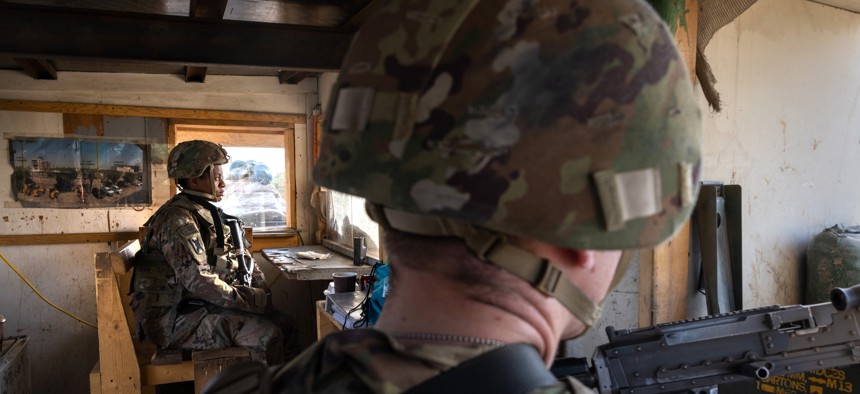
U.S. Army soldiers look onto Baghdad from a guardhouse on the perimeter of the International Zone on May 30, 2021 in Baghdad, Iraq. John Moore/Getty Images
US Will End Combat Mission In Iraq, Biden Says
US needs to "divert more of our body on threats in China and Russia," says Joint Chiefs Vice Chairman Gen. Hyten
The United States is ending its combat mission in Iraq, President Joe Biden announced Monday, though U.S. troops will remain in the country to continue training and advising local forces.
“Our role in Iraq will be...to be available to continue to train, to assist to help and to deal with ISIS as it arises, but we are not going to be by the end of the year in a combat mission,” Biden said at the beginning of a meeting in the Oval Office with Iraqi Prime Minister Mustafa Al-Kadhimi.
Biden said the U.S. remains committed to “our security cooperation and our shared fight against ISIS is critical for the stability of the region and our counterterrorism cooperation will continue even as we shift to this new phase we are going to be talking about.”
The military has about 2,500 American troops in Iraq today. At the White House briefing on Monday, press secretary Jen Psaki declined to provide details on how many troops will stay in Iraq past the end of this year to provide training and advising help.
“We feel this is a natural and next step in these ongoing strategic dialogues and we are moving to a phase not where we are ending our partnership, we are maintaining a presence in Iraq with a different mission,” she said. “This is a shift in mission, it is not a removal of our partnership or our presence or our close engagement with Iraqi leaders.”
The mission change in Iraq comes as the United States is also nearly finished withdrawing from Afghanistan, despite fears among some experts that terrorism could thrive in the country without an American military presence.
At a defense industry event Monday morning, Vice Chairman of the Joint Chiefs of Staff Gen. John Hyten said the drawdown in Iraq is necessary to ensure the military is prepared for a fight with China, or maybe Russia, if that day comes.
“We've been dealing with a significant threat in the Middle East for a long time. That has required significant blood and treasure for us to defend ourselves against that threat and the fact that there's been no long large scale attack since Sept. 11, 2001, against the United States is a remarkable achievement by the whole government, but primarily on the backs of the soldiers, sailors, airmen and Marines that have done that work over the years,” Hyten said at the launch of the Emerging Technologies Institute, a new private center focused on speeding military innovation.
“But I can tell you that the primary risk to this nation, long-term risk, is China,” Hyten said. “Maybe the nearer-term risk is Russia. And we have to make sure that we focus our attention on those. So that means, and you've seen it in Afghanistan and you're seeing it play out now in Iraq — and I'm not gonna make any announcements today, because that's the job of the folks across the river to make those announcements. But what you can see is, understanding that we have to not ignore the threats in the Middle East, but deal with the threat to the Middle East in a different way, with a smaller footprint, so we can divert more of our body on threats in China and Russia."
American combat troops deployed in Iraq in 2003 with the goal of ridding Iraq of weapons of mass destruction and toppling dictator Saddam Hussein. Combat operations ended in 2010, and nearly all troops left the next year, only to have to return in 2014 to combat the rise of the Islamic State.






